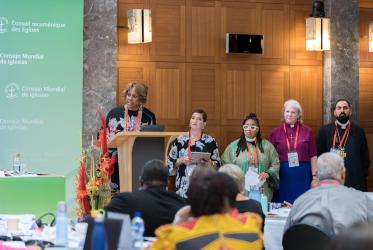In 2018 we celebrate the 70th anniversary of the World Council of Churches. In order to create a lively firsthand account of the ecumenical fellowship and of our shared journey, member churches have contributed stories of people, events, achievements and even failures, all of which have deepened our collective search for Christian unity.
This story was written by Anne Mitchell, Canada Yearly Meeting (CYM) representative to the WCC, along with Lesley Read, Gini Smith and Gale Wills of CYM’s ad hoc committee on WCC concerns; Jane Sweet of Toronto Monthly Meeting assisted with research.
Any views or opinions expressed in this article are those of the authors, and do not necessarily reflect the policies of the World Council of Churches.
The Religious Society of Friends (Quakers) in Canada was very much involved in the strong ecumenical currents that began in the latter part of the 19th century and gathered strength in many parts of the western world throughout the early decades of the 20th century.
Delegations were sent from Canada to the World Missionary Conferences, including the conference held in Edinburgh in 1910 to which many attribute the beginnings of an ecumenical movement – it was out of this movement that the founding of the World Council of Churches was finally accomplished in 1948.
In 1921, Quakers in Canada appointed several people to be in touch with churches in Canada to organize some form of peace association. These proceedings eventually resulted in the organization of a branch of the World Alliance for International Friendship and the participation with other churches in several inter-church associations including the Fellowship of Reconciliation and the League of Nations Society.
Unity among Quakers
The spirit of unity that underpinned the ecumenical movement also led to the three Quaker Yearly Meetings in Canada at the time, each with a different approach to their faith, to begin discussions that ultimately led to a unified Canadian Yearly Meeting in 1954.
This desire to work together led to the founding of the Canadian Friends Service Committee (CFSC) in 1931 as the service arm of Quakers in Canada, dedicated to “unify, co-ordinate and expand the work of the Peace, Social Service and Temperance Committees” of the three Yearly Meetings. Working with Friends, as well as the missionary branches of the Canadian churches, CFSC provided relief abroad. The next step in the process of Canadian Friends working toward an ecumenical presence on the world stage was for CFSC to become the voice for Canadian Friends.
In 1937, the Second World Conference of Friends took place to work at achieving understanding and common ground between what were, and still are, quite different approaches to faith and practice among Friends worldwide.
Proposal for a council of churches
That year, 1937, also saw two ecumenical conferences, one on Life and Work in Oxford and one on Faith and Order in Edinburgh. The desire to bring together these two, often conflicting approaches to faith and practice eventually prevailed at the Edinburgh conference where a proposal to unite the Christian churches in a “Council of Churches” was approved.
Not surprisingly this was in the face of both support and dissent. Dean Willard L. Sperry of the Congregational Church of the US said, “The air they had breathed in Edinburgh had been untainted by the rank odour of ecclesiastical politics.” A representative of the Presbyterian Church of the United States said he regarded the formation of the proposed world council of churches as a matter of life and death. “It is the one thing we have got that will appeal to the imagination of simple people and that the ordinary layman can understand.”
Voicing opposition, the Bishop of Gloucester in the Church of England stated, “Over many years I have followed the resolutions passed by Christian Churches on political, social or semi-political matters and they often have seemed to me to be inexpedient and ill-considered. A World Council of Churches might lead to considerable friction between the nations and might very likely be a cause rather than a preventive of war.”
Quakers and the proposed WCC
Canadian Friends were represented at this Edinburgh conference in 1937, alongside Friends from Great Britain and Ireland. Some of the conference participants questioned whether or not Quakers could become part of the proposed World Council of Churches. The conference Proceedings note:
We greatly hope that in the United Church the members of the Society of Friends may be included, but we are unable as yet to see what place they will have in a Church united on the basis of generally acknowledged ministry and sacraments. We trust that the Holy Spirit will show to us and to them His will. Meanwhile we rejoice in the share which they are taking in our efforts to find the way towards union.
A Friend from Ireland, when it was his turn to speak, said that the most important obstacle to unity was still a want of mutual understanding, respect, love and recognition of other Christians as being Christians. He concluded, “I do not believe that we can get towards any real unity in the more open sense that we are aiming at if we do not get that kind of unity and understanding and Christian love.”
Towards Canadian and US councils
The Second World War intervened in the plans to implement the Edinburgh conference resolution. In the meantime, Canadian and American Friends moved forward as best they could.
In Canada, representatives of the Missionary Branches of the Canadian churches and CFSC came together to form a Canadian committee of the World Council of Churches. At a meeting in New York in April 1943 attended by Canadian and US representatives, there was unanimous agreement that both Canadian and American churches each form a council of churches to enhance communication between the two countries and eventually with a world council.
The Canadian churches, CFSC, and other Canadian inter-church organizations which had participated in the New York meeting adopted a resolution that “a Canadian Council of Churches should be organized forthwith.” A constitution was developed and the first meeting, which included a representative of Canadian Friends, was held in September 1944.
WCC is formed
World events swirled around all this and undoubtedly affected the renewal of resolve to move forward with the founding of the World Council of Churches in 1948. That year, Canadian Friends issued a statement to the Canadian Press and to the Canadian Council of Churches:
The Canadian Friends Service Committee records its deep concern at growing tension made evident by events in China, Greece, Czechoslovakia, Finland and other countries. In all these situations spiritual values are being subordinated to the struggle for material and political power.... at this time we believe that the Christian forces of the world should take a common stand in confirming their primary allegiance to Jesus Christ and his way of life, thus strengthening bridges of goodwill across national and racial frontiers, and providing the nucleus of moral and spiritual power without which instruments of political policy are worthless.
Not only was the desire still strong to set aside the tensions between “faith and order” and “life and work,” there was now also a strong impetus among all Christian churches including the different branches of the Religious Society of Friends, to work together to build relationships and support people as they work on the basic concern of the world’s peoples – how to live in peace.
That was the impetus when the World Council of Churches was formed and remains the impetus today. Now, the WCC is reaching out to include working together with churches and people of other faiths. Let us continue to work together on promoting peace and all its ramifications in this our 21st century world.
| Sources 1921-1967 A Record of experience with Canadian Friends (Quakers) and the Canadian Ecumenical Movement, by Fred Haslam, 1968. Articles by Fred Haslam in Canadian Friend, October 1954 and December 1960. The Gloucester Citizen, Monday 16 August 1937 page 8. The Scotsman, Monday 16 August 1937 page 13; Thursday 19 August 1937 page 8. "Looking Back: Edinburgh 1937", The Second World Conference on Faith and Order held at Edinburgh, August 3 – 18 1937, Life and Work, Church of Scotland. Proceedings of the Second World Conference on Faith and Order held at Edinburgh, August 3 – 8 1937, edited by Leonard Hodgson, page 354. |







